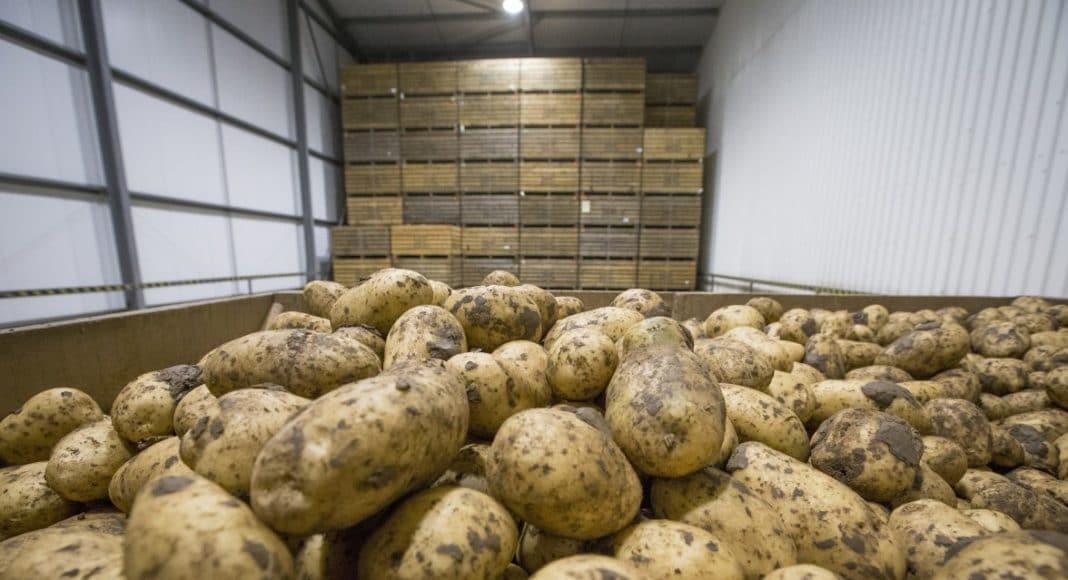[deck]Potato store managers will be able to call on information and support from an £800,000 ($1.4 million) fund ring-fenced for sprout suppression and storage advice as the uncertainty around the future of Chlorpropham (CIPC) continues.[/deck]
There have been several delays to the re-approval for use in the European Union (EU) of CIPC, which is used as a sprout suppressant on more than 80 per cent of potatoes stored in the UK.
The EU’s Standing Committee on Plants, Animals, Food and Feed (SCoPAFF) was scheduled to vote on the renewal of CIPC’s approval for use both as a herbicide and as a sprout suppressant at its December meeting – but a vote did not take place. It is on the agenda to be discussed again at the meeting in January. The European Food Safety Agency’s recommendation remains non-renewal.
AHDB, which already invests £800,000 a year in storage research and knowledge exchange, is calling on the experience and expertise of those providing storage advice in the commercial sector, in a bid to extend its reach. A new ‘Storage Network’ of advisors is being created after initial meetings in December and January.
Advice and Support from AHDB
In addition to the uncertainty on the status of CIPC, popular desiccant Diquat, which is used during potato harvest, has lost EU approval, with 2019 becoming the last growing season it can be used. Maleic Hydrazide, a growth regulator also used for sprout suppression has been re-approved but with changes to its label that may reduce the extent of its use in the field.
Dr Rob Clayton, Strategy Director at AHDB Potatoes, said: “The companies who hold the licences to distribute CIPC continue to work towards its re-approval. We have been monitoring this situation closely for some time and supporting growers and the industry in choosing sprout suppression options during this turbulent period is a top priority for AHDB Potatoes.
“Given this uncertainty, and the challenges faced by store managers this year after a tough growing season, we can today announce we have ring-fenced an additional fund of more than £800,000 to ensure all those who store potatoes have access to the advice they need, building on our existing investment.”
Storage Network
Plans are also underway to ensure that all those who store potatoes have face to face time with a storage expert, either at an event or through store visits.
Adrian Cunnington, Head of AHDB’s Sutton Bridge Crop Storage Research (SBCSR), said: “During 2019, we will be making it easier than ever for store managers to receive independent advice, based on the latest storage research. Our new Storage Network project involves using specialist trainers and advisors from industry to boost the services we already provide from Sutton Bridge.
“This will allow us to share research results and best practice more quickly and harness the expertise of those in industry to the benefit of all store managers.”
Extended Research Program
Mr Cunnington continued: “The team at SBCSR has a body of work collated over several years on all alternative sprout suppressants available in the UK, such as Ethylene and Spearmint Oil.
“We have already begun to build on this by diverting several research projects at SBCSR to improving the industry’s knowledge of alternative treatments, bolstering the programme of work which is already in progress.
“Our research will include treatments not yet available in the UK, in anticipation of potential future approval and an increased drive to understand the natural dormancy of potatoes on a variety by variety basis.”
The SBCSR team can be contacted via a free storage advice line on 0800 02 82 111 to discuss alternative options and give practical advice.
Results and data from research projects will be made available through AHDB events, training courses, websites, newsletters and through the new AHDB Storage Network programme.
Dr Clayton added: “While it is still possible that CIPC will retain its approval, we have ensured that we are as prepared as possible to deliver support during this uncertain time for the industry.”











